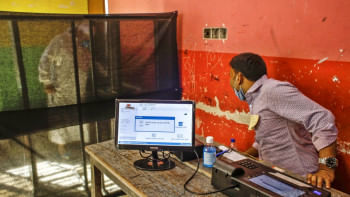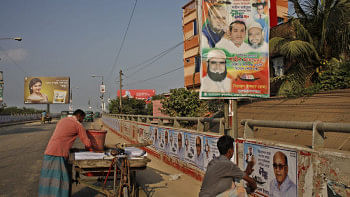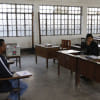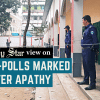People are tired of pointless elections. But does AL care?

In an ominous sign for democracy, voter turnout in Bangladesh's elections has been decreasing significantly in recent years, exhibiting voters' apathy towards this important process by staying away from casting votes. After the first phase of the ongoing upazila election, which saw 36 percent voter turnout, the ruling Awami League's General Secretary Obaidul Quader explained the poor turnout by saying that the paddy harvesting season as well as storms and rain in different districts were to blame. Nevertheless, he labelled the turnout "satisfactory."
Harvesting was over in almost all the places in the country before the second phase of election, held on May 21, and there was no rain on that day. Yet, the situation did not improve as the second phase saw only 37.57 percent voter turnout—second lowest since 2009.
Although there was not much difference in the voter turnout between the first phase and the second phase, the AL spokesperson came up with a different explanation this time, saying BNP, Transparency International Bangladesh (TIB) and some "anti-state" intellectuals were spreading falsehoods to discourage people from casting their votes.
The AL second-in-command, however, again termed the turnout "quite satisfactory."
In the third phase of the election, which was held on Wednesday, the polls saw 36.24 percent voter turnout—lower than the second phase. This time, Quader reiterated that the voter turnout was satisfactory, despite a natural disaster in the same week.
Now, one may ask whether the Awami League, one of the oldest political parties in the country, which has always claimed to have guaranteed people's right to food and franchise, is satisfied with 36-37 percent voter turnout. AL, which has been in power since 2009, always claimed to have 40 percent of the vote bank. If that is true, then judging by the voter turnout in recent elections, one can either assume that not all pro-AL voters are exercising their franchise, or only its own voters are turning up at the polling booths.
There are several reasons behind the voters' apathy that keeps them from exercising their franchise, including the absence of major political parties in the polls, the Election Commission's failure to ensure free and impartial elections, and the ruling party establishing a trend of being elected unopposed.
If people's apathy towards casting votes gradually turns into apathy for the democratic process, it may be dangerous for all political camps in the country, including the Awami League.
It also seems that a new voting system has been developed in the country over the past decade. Winning by all means and keeping opposition parties off the ballot has become the new voting system.
Take the last three national elections in 2014, 2018 and 2024, for example. Of them, the 2014 and 2024 elections were largely one-sided with most political parties boycotting them, while the 2018 election was questionable as opposition parties alleged that ballot stuffing took place on the night before the voting day.
There are several reasons behind the voters' apathy that keeps them from exercising their franchise, including the absence of major political parties in the polls, the Election Commission's failure to ensure free and impartial elections, and the ruling party establishing a trend of being elected unopposed. If people's apathy towards casting votes gradually turns into apathy for the democratic process, it may be dangerous for all political camps in the country, including the Awami League.
In the 2014 election, 153 candidates of AL got elected without a single vote being cast, which was enough to form the government.
The total number of voters in the 2014 election for all 300 seats was 9.19 crore, while the total number of voters for the 147 seats in which the election was held was 4.31 crore. A total of 4.88 crore voters, 53 percent of the total voters, were unable to cast their votes and their mandate was not required to form the government in 2014.
In such a situation, it seems the ruling camp is not taking any election—national or local government—seriously, and an attitude may have developed within the party that "whoever wins has to be one of ours."
This situation has also left voters with limited options: they can either cast their votes for the ruling party candidates or its dissidents. With the absence of major political parties in recent elections, the polls appear to be a fight between Awami League and Awami League. So, before any election, Awami League aspirants put in their best efforts to get the party ticket instead of wooing voters, seemingly believing that getting the party ticket is enough for them to get elected.
Like the electoral system, a new approach has been adopted by the Awami Leaguers, and most of them have become desperate to cling to power and get elected unopposed for that. The party men don't want any competition on their way to power. In the absence of the opposition parties, the AL candidates can't even tolerate their own party colleagues on their way to win.
This time, however, the ruling party changed its strategy and decided not to give party nominations and not to allow the party electoral symbol to be used in the local body polls, aiming to make the election participatory, increase voter turnout, and turn the election festive. But this strategy has so far fallen flat as it has failed to encourage voters to turn up at the polling booths.
Is it realistic to change the electoral culture that developed over a decade simply by changing strategy?
The time has come for the Awami League to realise why voters are turning away from casting votes. Will the ruling camp finally do some soul-searching? The chances are slim.
The Awami League, which has led all democratic movements before and after the birth of Bangladesh, is now busier with government affairs than its own organisation. It is busier bashing opponents and holding programmes to counter opposition parties, than finding out organisational weaknesses in its own ranks.
As the party prepares for a grand platinum jubilee celebration next month, it is high time for the party to do some soul-searching instead of focusing on countering its political arch-rival.
Partha Pratim Bhattacharjee is planning editor at The Daily Star.
Follow The Daily Star Opinion on Facebook for the latest opinions, commentaries and analyses by experts and professionals. To contribute your article or letter to The Daily Star Opinion, see our guidelines for submission.

 For all latest news, follow The Daily Star's Google News channel.
For all latest news, follow The Daily Star's Google News channel. 










Comments